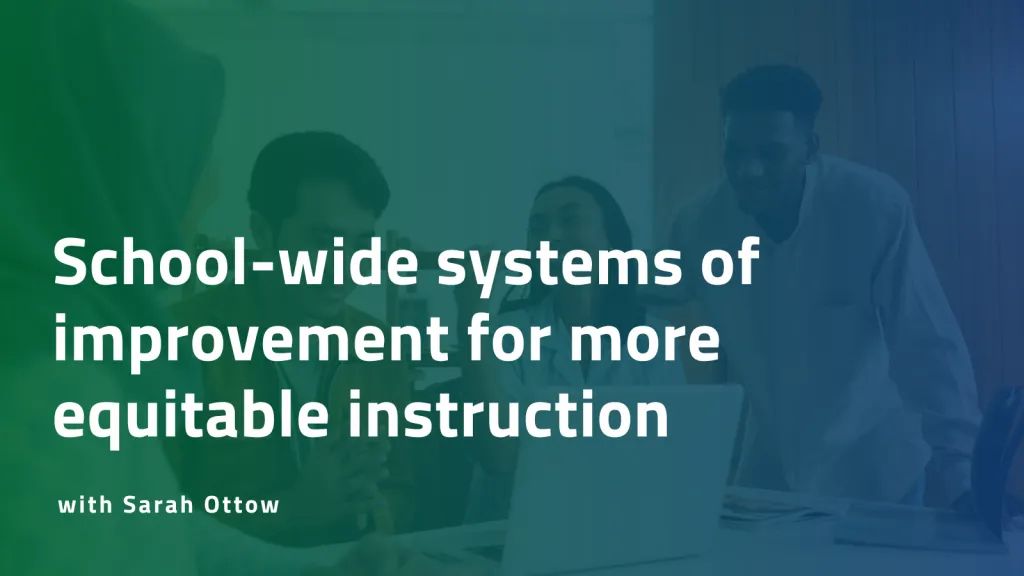School-wide systems of improvement for more equitable instruction


School-wide systems of improvement for more equitable instruction
There’s a quote by Henry Ford: “If you do what you’ve always done, you’ll get what you’ve always gotten.” In education, we speak often about closing achievement gaps and creating more equitable learning environments. But these issues have been prevalent throughout the history of education, and we need to carry out system-wide change for outcomes to improve. In short, change has to happen for change to happen.
Sarah Ottow, founder and Director of Professional Learning of Confianza and, joins us to discuss how her organization is approaching this systemic change towards better supporting multilingual learners through professional learning. She shares how her own identity impacts her work as an educator, how to be intentional about addressing language and cultural differences to include all students, and their approach to sustainable school improvement.
Listen to the full conversation here, or find highlights of the episode below.
What is the ‘language lens’?
“The language lens is essentially an approach that I developed over my career as a lifelong teacher,” Ottow explains. “It's really about making what we do more intentional as any teacher, any support staff, any leader so that we can believe and actually enact practices and mindsets that work for all learners.”
Her newest edition of her book, titled The Language Lens for Content Classrooms serves as a guide on this topic for teachers, coaches and leaders. We know that English learners or multilingual learners spend the majority of their learning time with general educators. We also know that even students whose first language is English will encounter unfamiliar academic language in the classroom every day. So it is crucial that all educators apply this "language lens” to how they approach their Tier 1 instruction.
“How can we start with what all students need? We start with students who may not identify as multilingual learners but are learning the language of your physical education class, your biology class, your third grade science class. Again, any learning space that students are in, there's language that goes along with that.”
Identity & updating the systems we work in
In her book, Ottow writes that, “As educators, we are products of the very systems we are trying to change from within.” Since educators were students themselves, we have learned a great deal about the brain, psychological safety and what learners need to develop agency rather than just being given knowledge.
Additionally, some educators may have had a fairly successful learning experience, but because the way they were taught worked for them does not mean it is up to date or designed so all students can succeed. For many educators, their success as students may be less to do with good instructional practices and more to do with inherent learning privileges due to their identity.
“As a white woman who represents over 70% of our nation's teaching force, being a teacher in an urban classroom my first couple of years I realized that my students of color, multilingual learners, students with special education needs were in situations that I could not directly relate to.”
Our identity and experience growing up and being students will inevitably show up in the way we are as educators now. It’s an important practice to continually be evaluating our classroom through multiple lenses, beyond our own lived experience, to ensure all students feel supported.
Creating sustainable, school wide systems
It’s important for these approaches to improving instruction and education to go beyond individual classroom walls. While in education, it’s easy for teachers or administrators to work in silos, Ottow’s team supports schools in working towards common goals and unifying their approach.
“The mission of the organization that I run, Confianza, is to improve cultural understanding, communication and collaboration for the whole school system,” Ottow shares. “It's not just one teacher in one classroom. There's always an ask, ‘How can you share what you're doing with other teachers?’ Likewise, ‘Leaders, how can you share what you're doing with other leaders?’”
In their system-wide vision of equitable instruction for all learners, including multilingual learners, they work with schools to determine “How do we have system-wide support for educators? What is a professional learning community? What is an instructional coaching cycle?”
They work with educators to set up conditions where they can learn and implement new instructional strategies for students and be successful. One of the most important of these conditions is equity of voice - both for students in the classroom and amongst colleagues.
“The language lens really attempts to have an approach that's really about empathy-driven leadership…So looking at whose voices are not being heard in the classroom? Whose voices are not being heard at the department level, or at the school level, or at the district level? It’s about making sure that people in the margins who maybe have been historically underserved or heard, that they're in the center of the classroom and the school and district.”
Episode resources:
- Download the full episode transcript
- Get her latest book Language Lens Self-Assessment - designed for all educators
- Learn more about Confianza, her organization
Sarah Bernadette Ottow is a voluntary multilingual and a lifelong learner of the world. Having taught all ages including adults in the US and internationally, Sarah is passionate about sharing her Language Lens® approach to make sure all learning spaces are accessible, engaging and inclusive. Sarah's work focuses on improving outcomes by reinforcing relationship skills and value-identification of diverse populations within systems. Certified in PK-12 ESL and Bilingual Education, Reading and Grades 1-8 with leadership certificates in coaching and diversity/inclusion, Sarah leads her organization, Confianza, to promote equity, language and literacy in schools starting with instructional leadership. Sarah is the author of The Language Lens for Content Classrooms: A Guidebook for Teachers, Coaches and Leaders, 1st Edition and 2nd Edition and the creator of the upcoming Language Lens Academy digital learning space.